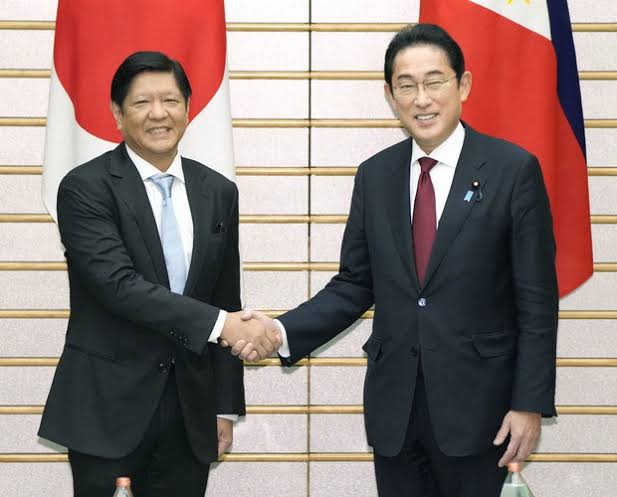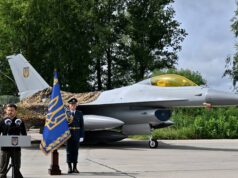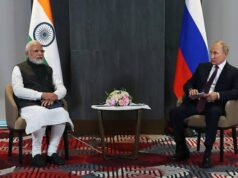Japan, Philippines to boost economic, security ties amid China rise

Japanese Prime Minister Fumio Kishida, right, and Philippine President Ferdinand Marcos Jr. shake hands ahead of their talks at the Japanese premier’s office in Tokyo on Feb. 9, 2023.
Japanese Prime Minister Fumio Kishida and Philippine President Ferdinand Marcos Jr. agreed Thursday that the two countries will further bolster economic and security cooperation, warning against China’s growing presence in the Indo-Pacific region.
At a joint press appearance after his talks with Marcos in Tokyo, Kishida said he pledged to provide a support package worth 600 billion yen ($4.6 billion) to the Philippines over the two years through March 2024 from Japan’s public and private sectors.
On the security front, Kishida and Marcos confirmed the two nations will continue their “two-plus-two” talks involving defense and foreign ministers, while agreeing to exempt Philippine diplomats from visas to Japan to promote human exchanges between the countries.
Kishida and Marcos also welcomed their agreement on guidelines to smooth humanitarian support and disaster relief operations by Japan’s Self-Defense Forces in the Southeast Asian nation.
The guidelines are viewed as a prelude to a new treaty aimed at facilitating joint exercises and reciprocal visits of their forces to one another’s countries, called the Reciprocal Access Agreement.
The two Asian nations affirmed that they would work toward signing the RAA in the first two-plus-two meeting held in Tokyo last April. Japan has signed a similar pact with Australia and Britain.
“Japan and the Philippines are neighbors across the sea as well as strategic partners sharing fundamental values,” Kishida said, underscoring that the two leaders “firmly affirmed” their deepening cooperation in various fields.
Marcos said the bilateral partnership is “stronger than ever as we navigate together the rough waters affecting our region,” adding that the two Asian countries will expand their engagements “across a wide range of mutually beneficial cooperation.”
Marcos’ visit to Tokyo, his first since taking office in June, has drawn public attention as it came immediately after his government deported four Japanese men suspected of being involved in a high-profile string of robberies across the nation.
As a key pillar of bilateral economic cooperation, Tokyo will offer around 377 billion yen in official development assistance for commuter railway projects that connect Manila with its neighboring cities, Japan’s Foreign Ministry said.
Other economic cooperation programs range from agriculture and telecommunications to energy security, the ministry added.
The Philippine leader’s five-day trip from Wednesday is also politically important as Tokyo and Washington are seeking to boost ties with Manila due to China’s increasing military and economic clout in the region, experts said.
In a joint statement released after their meeting, Kishida and Marcos “expressed serious concerns about the situation in the East and South China seas,” in a veiled criticism of Beijing.
Kishida and Marcos strongly opposed “the actions including force or coercion that may increase tensions,” according to the statement.
A change in the leadership in Manila has encouraged Tokyo and Washington to accelerate plans to improve relations, the experts said, noting that Marcos’ predecessor Rodrigo Duterte had sought closer ties with Beijing.
Last week, Marcos and U.S. Secretary of Defense Lloyd Austin agreed to allow American troops access to four more bases in the Southeast Asian country in an effort to keep in check China’s increasingly assertive actions over disputed territory in the South China Sea and toward Taiwan.
China, the Philippines, Taiwan, Malaysia, Vietnam and Brunei have overlapping claims in the South China Sea, a maritime area rich in natural resources that also serves as a critical trade route.
As for Taiwan, fears are mounting that the self-ruled island democracy could become a military flashpoint in the region, as Communist-led China regards it as a renegade province to be reunified with the mainland, by force if necessary.
Meanwhile, China has sought to further strengthen relations with the Philippines, with President Xi Jinping promising to invest about $22 billion in the nation, including projects that are already under way, when Marcos visited Beijing in January.
In their talks in Tokyo on Thursday, Marcos invited Kishida to visit the Philippines “at a mutually convenient time in 2023” and the Japanese premier accepted the request, the statement said.




